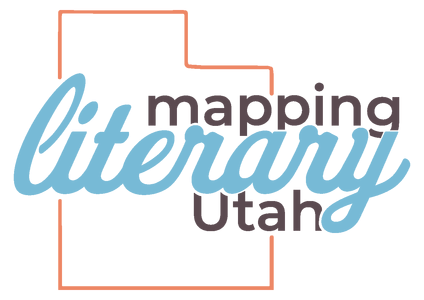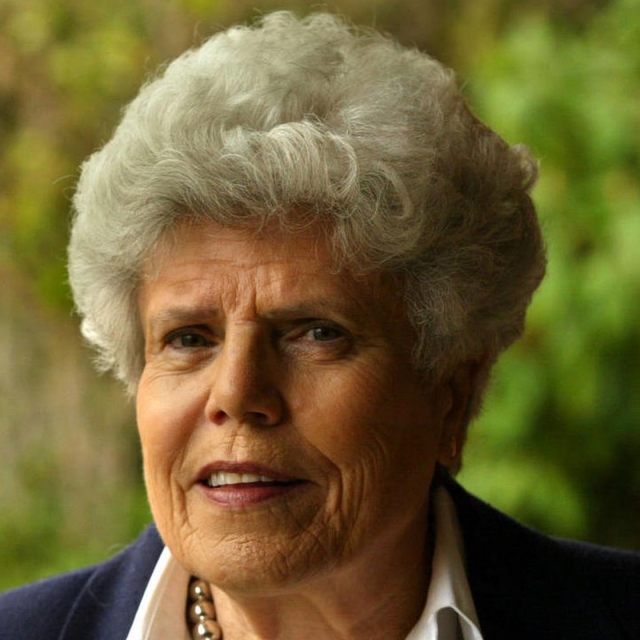A much beloved writer, activist, and community figure, Emma Lou Warner Thayne was born in Salt Lake City in 1924, to Grace Richards and Homer Warner. In a Mormon family of four children, she was the only girl. She described growing up with brothers as providing her with the tenets “Try hard. Play fair. Have fun.” Her father was, she said, the athlete and the extrovert, while her mother was a homemaker of “boundless faith,” though she also killed the snakes and taught the children to hammer and saw. The family spent its summers at a cabin in Mt. Aire, a setting for many of Thayne’s poems and stories. She and her husband, Mel Thayne, built a cabin for their family, just down the road from the Warner cabin, where she spent the lion’s share of many summers, making space, in the midst of a full family life, for writing.
Emma Lou Warner graduated from East High School, and earned a B.A. in English (1945) and M.A. in Creative Writing (1970) from the University of Utah. She met Mel Thayne in 1949, when he was running a boating concession at Pine View Reservoir. They married later that year, eventually making a family of five daughters, along with nineteen grandchildren and eighteen grandchildren. Thayne taught English as an instructor at the University of Utah, through the English Department and the Division of Continuing Education, from 1946-1976, and often taught a writing course thereafter, through 2013. She also served as the head coach of the U’s Women’s Intercollegiate Tennis team (1966-71).
Thayne’s life was marked by literary and community service. She was the first woman ever to serve on the board of directors of the Deseret News. William B. Smart, former editor of the Deseret News, recalled Thayne's dedication to honesty and accuracy in journalism. "She was a very strong advocate of openness and freedom of the press, and of transparency," Smart said. "She always insisted that we tell the whole story, and she was a very strong voice in supporting me in my efforts to create a truly frank and honest and open newspaper.” She served alongside general authorities of the LDS Church, including Thomas S. Monson, Neal A. Maxwell and James E. Faust.
Helen Mulder wrote of Thayne, in 2015, “After the death of our dear friend and mentor in the English Dept., Professor Clarice Short, Emma Lou [served] as her literary executor, collected Dr. Short’s unpublished poetry, found a biographer and saw the book through publication.” Thayne made many fast friends in and through writing, including Maxine Kumin and William Stafford. At a 1983 residency at the Virginia Center for the Creative Arts, she met Chicago painter Paul Fini, who later left his paintings to Emma Lou when he died of AIDS. Thayne organized an exhibit of his Fourteen Stations of the Cross in Salt Lake City, then donated them to the national AIDS foundation, where they traveled across the country with the AIDS quilt. A year later, Emma Lou represented the LDS Church at World AIDS Day. “With the privilege of a matriarch,” she wrote, “I had once again been opened to possibility through exposure to the world, to the quality of people unlike me.”
To that end, Thayne dedicated her energies to peace and anti-war activism. Her book How Much for the Earth (1983) reflected this focus. She spoke as the only woman at the Test Ban Treaty Conference in Kazakhstan in 1990, where she read poems from an earlier visit to Russia. She was honored many times for her community and literary work, including a Gandhi Peace Award, the YWCA Outstanding Achievement award, Utah Governor's Mansion Artist Award for literary accomplishments, the David O. McKay Humanities Award, the Association for Mormon Letters award for poetry, and an Honorary Doctor of Humane Letters from the University of Utah.
In 1986, Thayne was traveling in a car and when struck in the head by a metal bar that pierced the windshield. Much of her book of poems Things Happen came from this experience, but her final book, what she called a spiritual autobiography, ”The Place of Knowing," more directly engaged this experience. About her near-mortal accident, Thayne, “If that experience sounds mystical, well, I am a mystic. As I assimilated my accident, I learned this: I went away and returned with a promise to keep. Keeping that promise of offering peace would take the rest of my life. Love would be the directing force, love that is infinite.”
Toward the end of her life, Thayne described herself and her writing this way: “Out of a background of mountain living in a comradely athletic-aesthetic family has come the major part of my writing. Philosophically and culturally attached to Mormondom . . . I have inadvertently become a spokeswoman for the moderate Mormon woman . . . my writing deals with the dichotomies, frustrations, pleasures and harmonies tangled in the dailiness of expecting more than dogma and ritual in being a woman.”
Thayne died in 2014.
Work
Bibliography
Spaces in the Sage. Parliament, 1971. Poetry collection.
Until Another Day for Butterflies. Parliament, 1973. Poetry collection.
On Slim Unaccountable Bones: Poems. Parliament, 1974.
With Love, Mother. Deseret Book, 1975. Poetry collection.
Never Past the Gate. Peregrine Smith, 1975. Novel. Based on her experiences as a child in the 1930s.
A Woman’s Place. Nishan Grey, 1977. Novel.
The Family Bond. Nissan Grey, 1977. Essays.
The Guilty. 1978. A screenplay for a BYU Motion Picture Studio-produced, 21 minute film, directed by William N. Burch.
Once In Israel. BYU Press, 1980. Narrative prose and lyric poetry
How Much for the Earth? A Suite of Poems: About Time for Considering. Signature Books, 1983.
“Where Can I Turn for Peace?” (1985) LDS hymn.
As For Me and My House: Meditations on Living and Loving. Bookcraft, 1989. Short essays.
Things Happen: Poems of Survival. Signature Books, 1991.
Hope and Recovery: A Mother-Daughter Story about Anorexia Nervosa, Bulimia, and Manic Depression (Co-authored with her daughter Becky Thayne Markosian). Franklin Watts, 1992.
All God’s Critters Got A Place in the Choir. Aspen Books, 1995. Personal essay (and poetry) collection co-written with Pulitzer-prize winning historian Laurel Thatcher Ulrich.
The Place of Knowing: A Spiritual Autobiography. iUniverse, 2011.

